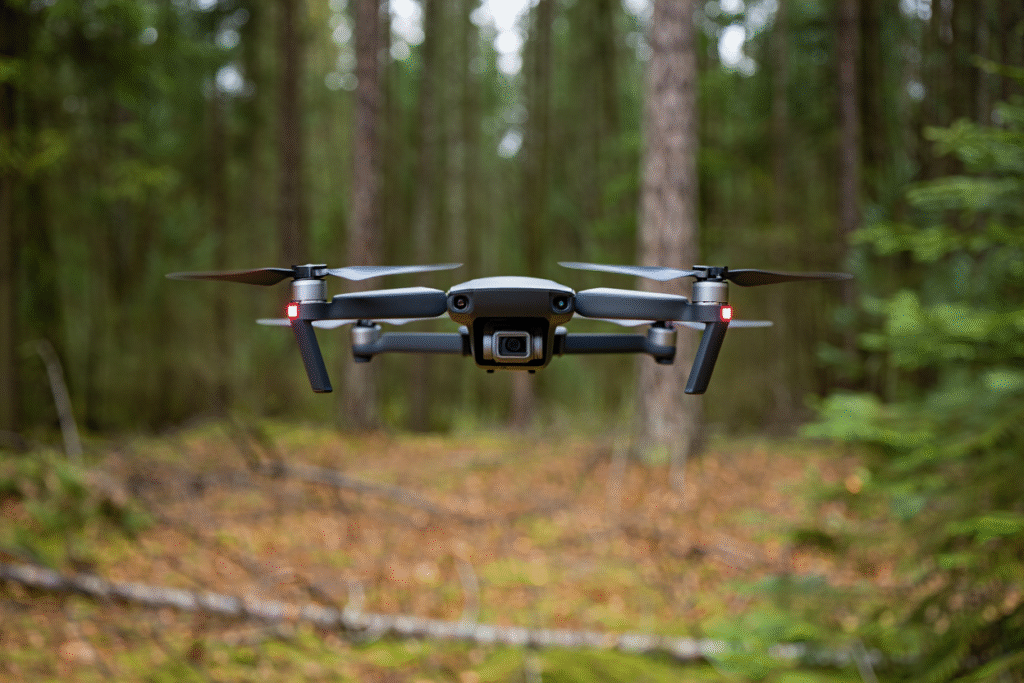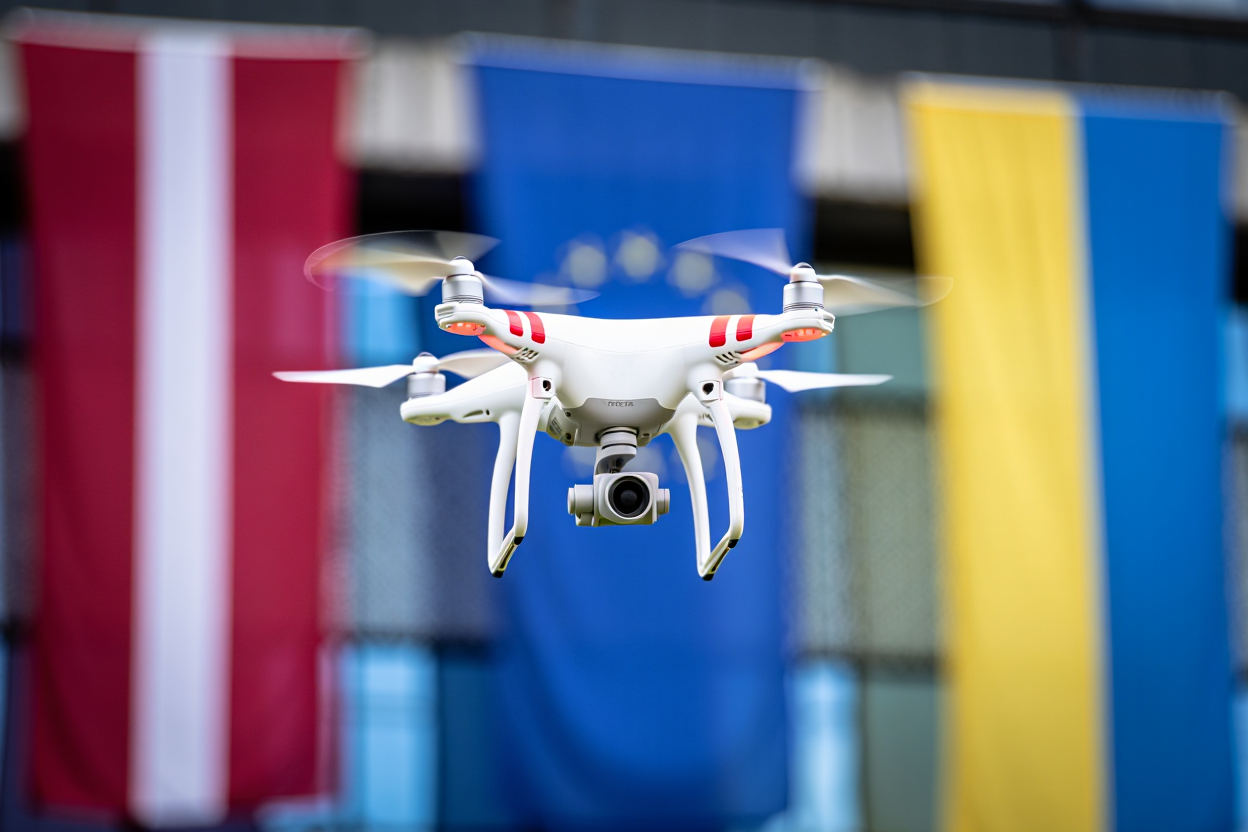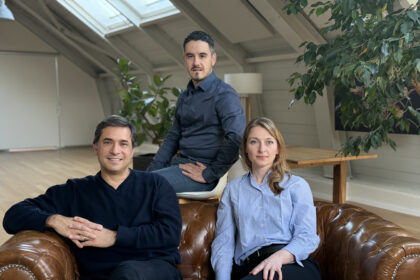This article first appeared on Labs of Latvia.
Latvia is rapidly becoming a significant force in the global drone industry, with a strong ambition to become a drone powerhouse. This strategic focus is built on a thriving local ecosystem, substantial government investment, and a key role in international defence initiatives. With its rich aerospace legacy, Latvia is punching well above its weight in the drone industry and attracting global attention.
The demand for drones is high, driven by Latvia’s own defence needs and its crucial contributions to the international coalition supporting Ukraine. In 2024, Latvia committed €20 million to the Drone Coalition supporting Ukraine, pledging the same amount for 2025. An additional €20 million was allocated in 2024 to build a “drone army” for Latvia’s own National Armed Forces (NAF), with half specifically for purchasing drones from Latvian companies.
The establishment of specialized testing facilities, such as the Šķēde Naval Range for drone system testing, provides unique advantages for real-world maritime testing for both national and allied forces, further expanding Latvia’s capabilities in the field. In addition, Latvia plans to open an Autonomous Systems Competence Center in autumn of 2025, envisioned as a leading international hub for aerial, ground, and maritime drones, including anti-drone solutions for NAF.
This growth doesn’t come without challenges. There’s a growing need for skilled professionals, with estimates suggesting Latvia will need at least 1,000 drone programmers and engineers to meet the sector’s demands.
Riga Drone Summit marks one year of the Drone Coalition
The dynamism of Latvia’s drone sector was demonstrated at the recent Drone Summit in Riga. This event marked the first anniversary of the International Drone Coalition, drawing over 1,500 attendees from more than 20 countries. A total of 97 companies showcased their products, many of whom are part of the coalition network or aspire to join.
A highlight of the summit was a demonstration at a military training area near the Ādaži Military Base, where seven Latvian drone companies showcased their technologies to an audience of 200 observers. The demonstrations were impressive, featuring AI-targeting capabilities, precision payload drops on targets, fibre-optical cable systems, and even drones capable of landing and driving under vehicles.
The Drone Coalition represents one of the most significant multilateral defence technology initiatives of recent years. Co-initiated by Latvia and co-led with the United Kingdom, the coalition brings together 20 nations committed to collectively contributing €600 million in drone technologies to strengthen Ukraine’s defensive capabilities.
The coalition’s achievements are already substantial – since its establishment, it has facilitated the delivery of over 100,000 drones to Ukraine. The financial commitment is equally impressive: the Drone Coalition Fund amassed €1.8 billion in contributions in 2024 and has received pledges exceeding €2.75 billion for 2025. As part of the Drone Coalition, two Latvian companies won contracts worth €17 million to supply 12,000 drones to Ukraine in the first half of 2025, outperforming 265 international competitors.
For Latvia, co-leading this coalition represents more than just international cooperation – it positions the country at the center of a critical defence technology network. This leadership role, combined with Latvia’s growing domestic drone manufacturing capabilities, reinforces the nation’s ambition to establish itself as a major player in the global drone industry.
Latvian drone manufacturers: Military, dual-use, and civil innovations
Latvia’s drone ecosystem consists of a mix of specialized companies, each catering to different markets – from battlefield-ready systems to industrial and commercial solutions. Let’s look at some of the prominent players shaping the industry.

Military drone manufacturers
Several Latvian companies are at the forefront of developing advanced drones specifically for defence purposes, providing crucial capabilities to armed forces. Some key players include:
- Eraser, a startup launched by the established defence industry company Belss, focuses on the research and development of military UAVs. Their drones feature a modular design adaptable for various functions like reconnaissance, target marking, and payload transport. The company closely collaborates with NAF and military experts to ensure technical solutions meet real-world operational needs and scenarios.
- Temeso focuses on aeronautics and mechanical engineering, primarily providing target drone manufacturing and piloting services. They also engage in research projects to improve UAV control systems and production technology.
- Defence tech startup Origin Robotics specializes in advanced autonomous aerial combat systems, notably developing “BEAK” unmanned combat aerial vehicles and the “BLAZE” AI-powered counter-drone system. Their solutions, which are cost-effective and designed for rapid deployment, are already in service with the Ukrainian military and certain NATO countries.
- Natrix produces unmanned ground vehicles for military and civil use that can carry significant cargo (up to 200 kg). These “land drones” can be used for delivering ammunition, equipment, and food to critical frontline locations, and are being tested in Ukraine.
Dual-use drone providers
A number of Latvian companies develop drone technologies that serve both military and civilian needs, allowing for broader market appeal and quicker development. Some prominent examples are:
- Atlas Dynamics is an industrial drone manufacturer, one of the biggest and most established players in Latvia’s drone industry. The startup has delivered hundreds of drones to Ukraine primarily for use in reconnaissance, while also maintaining industrial applications. They have expanded their manufacturing footprint in Riga, and their products are supplied to governments, commercial clients, and academic institutions worldwide.
- Edge Autonomy (formerly UAV Factory), a globally recognized leader with a strong presence in Riga, produces advanced autonomous uncrewed aircraft systems (UAS) like their “Penguin” fixed-wing UAVs and “Octopus” optical gimbals. Their field-proven solutions are used by governments, commercial entities, and academic institutions worldwide for diverse military, civil, and academic applications.
- SUBmerge Baltic is a startup specializing in the development and production of autonomous underwater drones for multi-purpose operations. Their flagship product is the PIKE marine drone, designed for both civilian and military applications, particularly suited for the low-visibility conditions common in the Baltic Sea.
- Baltic Unmanned stands out as a specialized drone services company that combines distribution, training, and operational support across both military and civilian sectors. The company serves as the official representative for Quantum Systems in Latvia and Lithuania. Beyond equipment distribution, Baltic Unmanned provides expert consultations and training.
Civil applications innovators
While many Latvian drone companies have pivoted toward military applications due to current geopolitical circumstances, the foundation of the industry includes companies with strong civilian and industrial focuses. In addition to drone manufacturers, there are many companies that develop drone software or supply systems to drones. Some of the key players in the civilian drone space include:
- Fixar specializes in powering commercial autonomous UAVs for industrial applications. The company develops and manufactures its own drones, distinguished by a patented “Fixed Angle Rotor” (FAR) system. This unique design allows their drones (like the flagship FIXAR 007) to combine the benefits of both multi-rotor (vertical take-off and landing – VTOL) and fixed-wing (efficient forward flight) drones.
- Lightspace (acquired by Finnish Summa Defence) specializes in AR and VR display systems, particularly multi-focal AR headsets. While not a drone manufacturer, they develop advanced AR solutions for drone ground control, enhancing situational awareness for operators.
- SPH Engineering provides software solutions and integration services for drones. The company doesn’t manufacture drones, but provides the “brains” and the specialized tools that enable drones to perform complex and high-value tasks across various industries. They have a global customer and reseller network, making them a very influential company in the drone ecosystem. In addition, the company develops immersive drone light shows, merging art and tech for large-scale events.
- Ascent Lumina develops advanced computer vision and visual navigation technologies to enhance the performance and situational awareness of unmanned systems. They build software in the fields of AI, machine vision, augmented reality, and robotics.
- Firms such as Flyvision and Skycam specialize in aerial cinematography and photography, catering to media production, advertising, and surveying needs.
A drone nation in the making
Each Baltic state seems to have carved out its own niche in technology and innovation. While Estonia leads in digital governance and cybersecurity, Lithuania has emerged as a fintech powerhouse. For Latvians, drones have become “our thing”– a defining sector where the country excels.
The future of warfare, surveillance, and logistics will increasingly rely on unmanned systems, and Latvia is determined to be at the forefront. As the “Drone War” in Ukraine unfortunately accelerates technological advancements, Latvia’s expertise could shape not just its own security, but also NATO’s defence strategies for years to come.
This article first appeared on Labs of Latvia.





